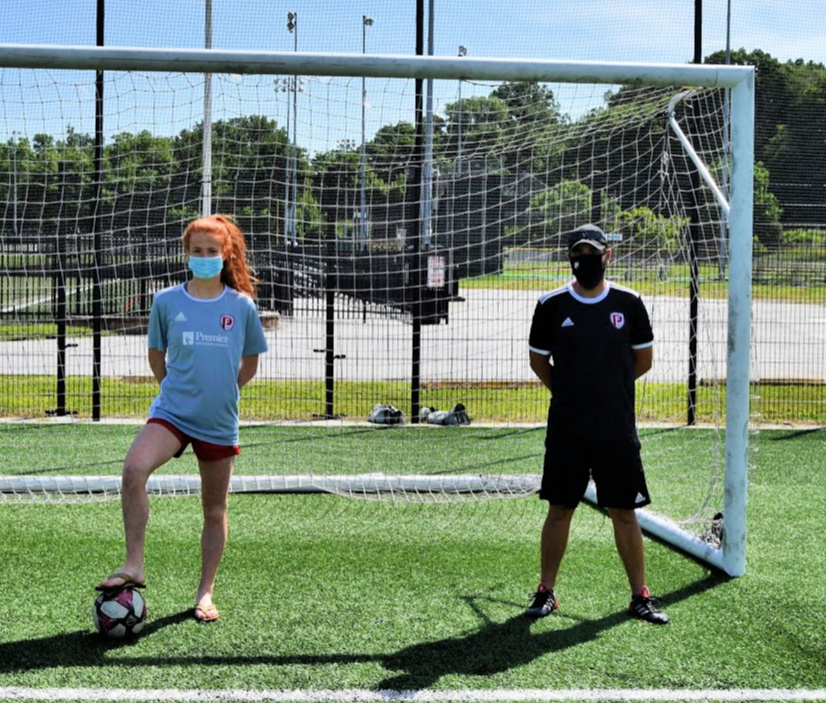Making A Difference From Six Feet Apart And Beyond
“This is stupid,” my 18-year-old daughter complained as she logged into her first Zoom soccer meeting. “What are we even going to talk about, we aren’t playing soccer.” My daughter, a senior, wasn’t alone, when she found herself in uncharted territory without the sport she loved for the first time since she was 7 years old.
Like so many other youth athletes, suddenly adjusting to a life without sports hasn’t been an easy process. When almost every spare minute of your life has been spent on the field or court, many of your teammates you consider your closest friends, and you’re used to a constant supply of exercise-induced melatonin, losing your sport can have devastating effects. And what about the juniors and seniors who were hoping to get recruited? Or possibly worse yet, the seniors who will never get another chance to step foot onto a court or field. Everyone seems to be struggling for one reason or another. Michael Phelps, the 23-time Olympic swimming champion was hit hard. “The pandemic has been a challenge I never expected,” he told ESPN. “I’m used to traveling, competing, meeting people. This is just craziness. My emotions are all over the place. I’m always on edge. I’m always defensive.” And Phelps doesn’t even compete any longer.
But if I had to find one bright light in all of this darkness, it would be the coaches and administrators. Hundreds and thousands of men and women all over the country and world who have been able to step up in creative and emotional ways that many have never been trained for, to meet not only the physical needs, but also the emotional and psychological needs of so many kids.
My daughter’s first Zoom session began with her coach asking each of them to tell him something good about the quarantine and something bad. Her coach and teammates appeared in Brady Bunch boxes and for the first time in weeks, I saw her smile. Soccer wasn’t even mentioned. My daughter had been quiet for weeks and I tried my best to give her space. I knew she was grieving the loss of her last semester as a senior in high school. I listened as the players expressed their anger and disappointment. When it was my daughter’s turn to speak it seemed she suddenly had a lot to say. “It just sucks that we are going to miss prom and graduation.” Her voice cracked as she asked her teammates if they thought they would ever play again together as a team. My heart sank; many of them had been teammates since they were eight.
6 EXERCISES TO SURVIVE VIRTUAL LIFE
Her spirits seemed lifted after that first Zoom call and I was grateful for her coach, who took the time to make sure his players were first and foremost coping mentally. She began to look forward to her weekly meetings. Workout packets and homework were assigned. Players were asked to watch previous games and identify weaknesses and strengths. Craig Scangarella, the Girls ECNL Director of Coaching at Penn Fusion Soccer Academy, explained how important it was to keep things as normal as possible for his players. “Although you can’t replicate face-to-face training, you can create an environment of teamwork with group presentations and competition by holding players accountable for weekly workouts.”
A friend recently shared with me that on her son’s birthday his teammates and coach surprised him with a Zoom team celebration. As they sang “Happy Birthday” she was so touched she had to sneak outside to hide her tears. Daily motivational quotes and phone calls from her coach helped Emma Woodcock, a high school shot put and discus thrower, cope with the isolation of quarantine. “Whenever I was having a bad day, I would reread the quotes and they would bring me back to a happy place.” Dance coaches held virtual dress rehearsals for performances that were canceled. Their dancers spoke about how exciting it was to perform and how they felt like they were back in the studio again. An AAU basketball coach created livestream exercise sessions and encouraged players to include their siblings and parents. These interactions not only made it fun but allowed players and coaches to learn more about each other than they might have on the field. It was the dedication and creativity of these coaches that kept their athletes mentally engaged, physically fit and added some fun during a difficult time.
GOAL PLANNING DURING CORONA VIRUS
Like so many other milestone celebrations around the world, when it came time for my daughter’s soccer senior night, it was celebrated virtually. A night we would have been on the field, handing her flowers and getting our picture taken, we were instead sitting around the kitchen table watching our laptop. The ceremony was heartfelt, and it was evident the love and creativity that went into making it memorable. Each player was celebrated with pictures past and present and fond wishes for what was ahead. Although it looked much different than the night we anticipated, it somehow seemed more special.
It was not long ago that I complained about the time commitment involved in youth sports, the overnight tournaments and lack of family time. But like for most people, this pandemic has changed the way I view the world and others. I miss watching my kids play sports. And I have a deeper appreciation for the coaches and teachers who are such a big part of their lives.
Kim O’Rourke is a soccer mom to three daughters who play on college and high school teams. She estimates that she has been to over 4,000 soccer games in the last 15 years. She tries to find humor in the crazy world of youth sports. She shares her stories about parenthood, health and relationships on her blog www.madcrazylife.com, Facebook: https://www.facebook.com/mymadcrazylife/Instagram: https://www.instagram.com/mymadcrazylife/
